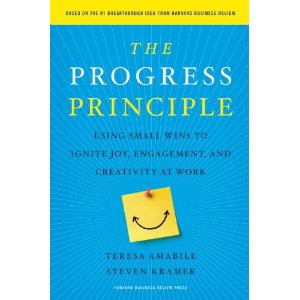The Progress Principle was just published. A big congratulations to Teresa Amabile and Steven Kramer. I love this book, it is based on incredibly rigorous research, it provides the the best evidence ever of the power of small wins (one of my obsessions in Good Boss, Bad Boss), and it is chock full of useful advice that every executive, manager, and team member needs to do better work and to take more pleasure from the process of doing work. My advice is to simply buy the book. But if you want a few more details, here is a review I just did at Amazon because I got excited all over again when I started re-reading the book:
I read an advance copy of The Progress Principle several months back, and I just went back and read the book again. I am even more impressed this time than the last. Four things struck me in particular:
1. While most management books are based on anecdotes, the biased recollections of some famous executives, or on research that is presented as rigorous (but is not… Good to Great is a perfect example), the Progress Principle is based on the most rigorous field study ever done of creative work. And it draws on other rigorous work as well. As a result, the overall advice about the importance of small wins may be known to many people, but once you start digging into the smaller bits of advice about how to keep work moving along, the evidence behind those is very strong. In my view, the Progress Principle is the best example of an evidence-based management book I have ever seen.
2. The authors didn't drown in their rigor and the details of their work. They worked absurdly hard to write a book that is quite engaging to read and chock full with one implication after another about what you can do right now to do more effective work and to motivate it in the people around you.
3. Finally, the main point of this book may seem obvious to some readers, but if you listen to most management gurus and fancy consulting firms, the approach that the authors suggest is actually radically different. The broad sweep of strategy and radical change and big hairy goals is where much of modern management advice focuses, yet the finding from this book that it is relentless attention to the little things and the seemingly trivial moments in organizational life that really makes for greatness is not something that most leaders and their advisers get, yet it is the hallmark of our most creative companies like Pixar, Apple, Google, IDEO and the like. The implication of The Progress Principle, for example, that management training should focus on how to deal with the little interactions and smallest decisions — and that is what makes for great leaders and organizations — would, if taken seriously, mean completely revamping the way that management is taught throughout the world.
This book isn't a bag of breathless hype, it doesn't make grand and shocking claims, and it doesn't promise instant results. But it is fun and easy to read, it is as strongly grounded in evidence as any business book ever written, and it is relentlessly useful because it points to little things that managers, team members, and everyone else can do day after day to spark creativity and well-being. And it shows how those little things add-up to big victories in the end. I believe it is one of the most important business books ever written.
In the name of full disclosure, I am friends with the authors and did endorse the book. But I am friends with a lot of authors, but when they write bad books, I decline endorsement requests, and as I did very recently, let them know that I think their books aren't very good. Yes, I am biased, but I believe that this book deserves to be a #1 bestseller.
P.S. A special request to you, dear readers. If you love the Progress Principle as much as I do, please do a little something to get the word out about the book — an Amazon review, a blog post, a tweet, or tell a friend. The authors are working hard to get the word out, but they don't have a huge marketing machine or giant budget behind them, all they have is a great book.
